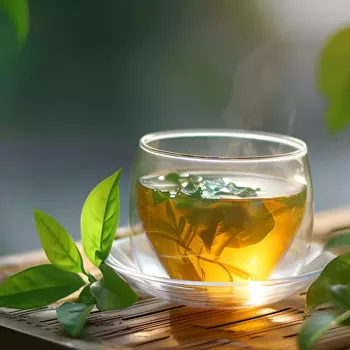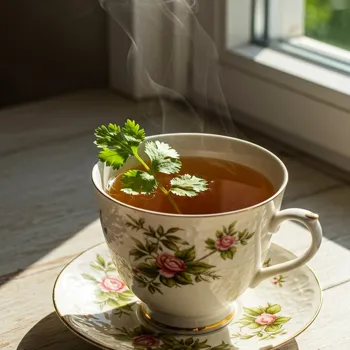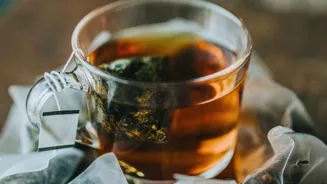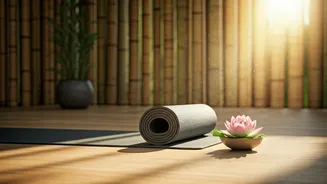Discover the calming benefits of herbal teas for relaxation. Unwind with nature's remedy and find your inner zen
In the hustle and bustle of modern India, life can feel like a never-ending series of deadlines,
traffic jams, and family responsibilities. It's no wonder stress and anxiety are on the rise.
But before you reach for over-the-counter solutions, consider a simpler, more natural remedy embraced by generations: herbal teas. These aromatic brews, made from flowers, leaves, roots, and herbs, offer a gentle yet effective way to calm the mind, soothe the body, and promote overall well-being.
Herbal teas are not just beverages; they are little rituals of self-care, offering a moment of peace in a chaotic world. Let's explore the many ways these delightful drinks can help you unwind and find your inner zen.
Herbal teas offer natural relaxation without caffeine
Herbal teas have a rich history, dating back centuries in various cultures. From ancient China to traditional Ayurvedic practices in India, herbal remedies have been valued for their medicinal properties.
Unlike black tea or green tea, which are derived from the Camellia sinensis plant and contain caffeine, most herbal teas are naturally caffeine-free. This makes them an ideal choice for those seeking relaxation, as they won't disrupt sleep or cause jitters.
The calming effects of herbal teas come from the unique combination of compounds found in each herb. For example, chamomile contains apigenin, an antioxidant that binds to certain receptors in the brain, promoting relaxation and reducing anxiety.
Lavender, known for its calming aroma, contains linalool, a compound that has sedative properties. Peppermint, with its refreshing scent, can help relieve tension headaches and relax muscles. These are just a few examples of the many herbs that can contribute to a sense of calm and well-being.
Choose high-quality herbal teas for relaxation from reputable sources
When selecting herbal teas for relaxation, it's important to choose high-quality products from reputable sources. Look for teas that are made from organic or wild-harvested herbs, as these are less likely to contain pesticides or other contaminants.
Pay attention to the ingredients list and ensure that the tea contains only natural herbs and spices, without any artificial flavors or additives. Many Ayurvedic shops and local stores now offer a wide variety of herbal tea blends specifically designed to promote relaxation.
You can also create your own custom blends by combining different herbs to suit your individual needs and preferences. Experiment with different combinations and flavors to find what works best for you.
For example, you might combine chamomile and lavender for a sleep-inducing blend, or peppermint and ginger for a digestive aid that also calms the nerves.
Brew herbal teas mindfully for maximum relaxation
To maximize the relaxing benefits of herbal teas, it's important to brew them properly. Follow the instructions on the package, but generally, you'll want to steep the herbs in hot water for at least 5-10 minutes. This allows the beneficial compounds to be released into the water.

Cover the cup or teapot while steeping to prevent the essential oils from escaping. Use filtered water for the best flavor, and avoid using boiling water, which can scorch the herbs and make them taste bitter. Once the tea is brewed, savor each sip and allow the aroma to fill your senses.
Find a quiet place to enjoy your tea, away from distractions. You might light a candle, listen to calming music, or simply sit in silence and observe your breath. Make tea time a ritual, a moment to disconnect from the world and connect with yourself.
Herbal teas offer health benefits like antioxidants and immune support
In addition to promoting relaxation, herbal teas offer a range of other health benefits. Many herbs have antioxidant properties, which can help protect the body against damage from free radicals. Some herbs can also help boost the immune system, improve digestion, and reduce inflammation.
Chamomile, for example, has anti-inflammatory properties that can help soothe irritated skin and reduce muscle spasms. Peppermint can help relieve bloating and gas, while ginger can ease nausea and improve circulation.
Before incorporating herbal teas into your daily routine, it's always a good idea to consult with a healthcare professional, especially if you have any underlying health conditions or are taking medications.
Some herbs can interact with certain medications, so it's important to be aware of any potential risks. However, for most people, herbal teas are a safe and gentle way to support overall health and well-being.
Incorporate herbal teas for stress relief and relaxation
Incorporating herbal teas into your daily routine can be a simple yet powerful way to manage stress and promote relaxation. Start by identifying the times of day when you feel most stressed or anxious.

Perhaps it's in the evening after a long day at work, or in the morning before facing a challenging task. Plan to enjoy a cup of herbal tea during these times to help you unwind and center yourself.
You can also create a calming bedtime routine by drinking a cup of chamomile or lavender tea before going to sleep. This can help you relax your mind and body, making it easier to fall asleep and stay asleep throughout the night. Remember, the key is consistency.
Make herbal tea a regular part of your life, and you'll soon begin to experience the many benefits of these ancient remedies. So, the next time you're feeling overwhelmed, reach for a cup of herbal tea and let its soothing properties transport you to a place of peace and tranquility.
















